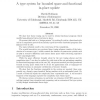Free Online Productivity Tools
i2Speak
i2Symbol
i2OCR
iTex2Img
iWeb2Print
iWeb2Shot
i2Type
iPdf2Split
iPdf2Merge
i2Bopomofo
i2Arabic
i2Style
i2Image
i2PDF
iLatex2Rtf
Sci2ools
126
click to vote
NJC
2000
2000
A Type System for Bounded Space and Functional In-Place Update
We show how linear typing can be used to obtain functional programs which modify heap-allocated data structures in place. We present this both as a "design pattern" for writing C-code in a functional style and as a compilation process from linearly typed first-order functional programs into malloc()-free C code. The main technical result is the correctness of this compilation. The crucial innovation over previous linear typing schemes consists of the introduction of a resource type 3 which controls the number of constructor symbols such as cons in recursive definitions and ensures linear space while restricting expressive power surprisingly little. While the space efficiency brought about by the new typing scheme and the compilation into C can also be realised by with state-of-the-art optimising compilers for functional languages such as Ocaml [16], the present method provides guaranteed bounds on heap space which will be of use for applications such as languages for embedde...
Related Content
| Added | 19 Dec 2010 |
| Updated | 19 Dec 2010 |
| Type | Journal |
| Year | 2000 |
| Where | NJC |
| Authors | Martin Hofmann |
Comments (0)

